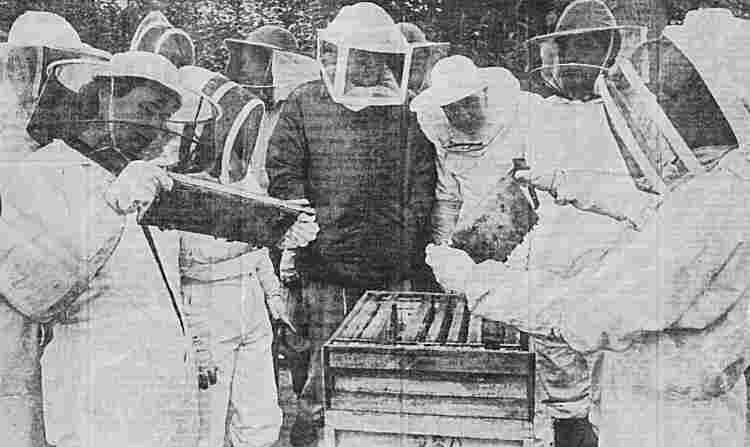This page has been prepared from a press cutting that was not in very good condition. The original source was the 'Leicester Mercury'.
Alistair Reid is at the right and I am the one in the centre without the bee suit on, the only other person that I can recognise is Don Walkinshaw, who is immediately on my left with his spectacles resting inside his veil. The white panel below is the reporter's own words apart from the last couple of sentences, which may not have the exact wording of the original as the corner of the piece of newspaper was missing.

Honey has traditionally been a product of the countryside, but urban beekeeping is becoming increasingly popular. Reporter LYN HEATH and photographer TREVOR GREWCOCK visited a Leicester apiary to find out all about the hobby
"City gardens are a hive of activity"
As I stood, quaking with terror, in the middle of a cloud of bees, I marvelled at the enthusiastic group gathered round a hive containing 50,000 of the creatures.
Clad in suits that would do justice to a character in the film Star Wars, they seemed totally unmoved by the thickening mass of angry bees surrounding us.
This was all part of a demonstration class on bee-keeping taken by Mr. Alistair Reid, a retired deputy city architect from Knighton who started his hobby 11 years ago.
"The countryside is no longer a good source of honey because of the removal of hedgerows and the decline of the number of meadows where natural flowers are left to grow," said Mr. Reid, a past chairman of Leicestershire and Rutland Beekeepers' Association.
"The growing popularity of oil seed rape with its bright yellow flowers did something to compensate for this, but the honey produced from this is not to everyone's liking", he said.
"But there are an abundance of garden flowers and lime trees in cities, which give a lovely green tinted honey that I think is the best in the world."
Evening classes organised by Leicestershire County Council are held throughout the winter for beginners and Mr. Reid has a series of demonstration classes during the summer at an apiary at the back of De Montfort Hall in Leicester.
Mr. Reid is well known for collecting bees from gardens and attics.
Obsession
One of his aims is to eliminate ill-tempered bees. "Until the beginning of this century, the British bee had a good temperament but they were wiped out by a disease, and strains brought in from the Mediterranean made the bees here more aggressive."
"By selective breeding, we are trying to return to the native British bee and devise simple techniques for increased honey production," he said.
Mr. Reid thinks the current obsession with healthy eating has contributed to the popularity of bee-keeping. "There is nothing better than pure English honey with the natural pollen and enzymes included. It should be a vital part of any healthy diet," he said.
It costs about £100 to set up a new hive and another £20 for the correct protective clothing. A small nucleus of bees is about £35 and the maintenance costs are in the region of £10 a year. Although the initial outlay is substantial, an established hive can be cheap to run.
To offset the expense, selling honey can be a lucrative business. A hive of around 50,000 bees can produce 60lb. of honey and, at up to £1.30 a jar, the bees should take in a tidy profit.
But Mr. Reid stresses, anyone setting up a hive must be sensible and take proper precautions, making sure they have learned the craft thoroughly.
"These courses are designed to show people the enjoyment of bee-keeping and how to cope with problems such as swarming, so that they do not cause a nuisance to their neighbours," said Mr. Reid.
Mr. Reid's wife also has a keen interest in the bees, cooking with the honey and advising beginners.
As a person that writes a considerable amount about bees I would like comment on some of the language used in the above article.
I was present at the time and can say that the reporter concerned was frightened... I believe that this fear was not caused by the event itself, but was present from the young lady's upbringing and shows through in her perceptions of what was going on.
The wording "the thickening mass of angry bees" is a particularly unfair description... The bees concerned were very gentle, to be fair, there were many bees flying around, but that was most likely due to a bit of banging about in the crowded conditions. In other circumstances, I could have manipulated those bees myself without anything other than a veil and certainly only a few bees actually flying.
Another misconception is highlighted by the wording... "Honey has traditionally been a product of the countryside" whereas in actual fact beekeeping has only been driven into the countryside in the last century or so, mainly due to lack of education among a population for whom beekeeping is now a rarity rather than the commonplace activity of 120 years ago. When there was a couple of hives at the bottom of 50% of the gardens of Britain, nobody was scared of bees, simply because everybody knew they were unlikely to sting unless severly mucked about.